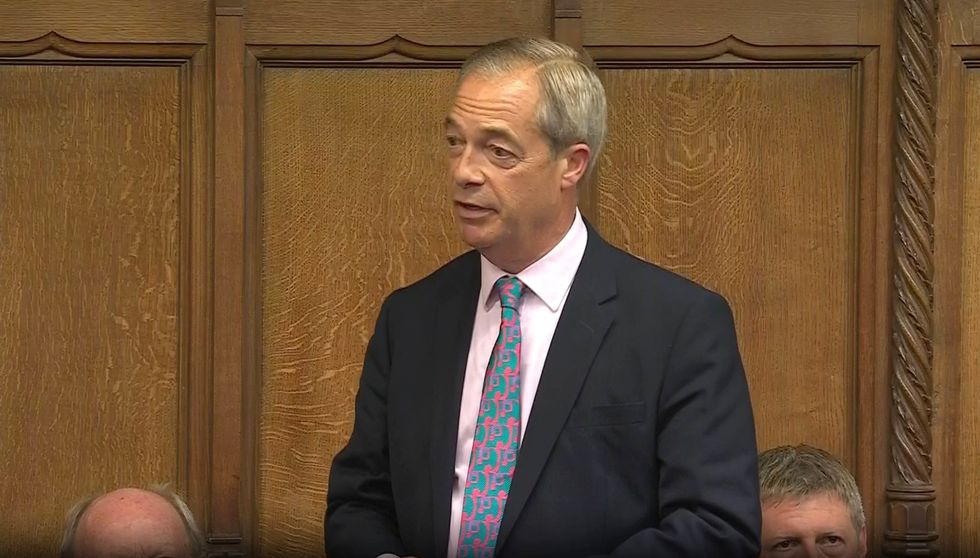Rise of Reform UK: Why British voters are shifting to Farage and can Reform outgun the Tories

None

Reform received 14 per cent of vote share and 4 million votes in the 2024 Election
Don't Miss
Most Read
The British political landscape has witnessed significant shifts in recent years, with the Reform Party sparking a revolt among voters against traditional established parties.
The 2024 election showed this more than ever as the Reform party took 14 per cent of vote share, 4 million voted, 5 MPs and a hundred 2nd places.
The British people are well on the path to political revolt - but what is it that is driving the shift to support Nigel Farage and Reform and can the traditional parties really do anything to stop the current momentum.
Reform are currently on the brink of a major breakthrough, especially if the Tories continue to veer to the left under the likes of Tom Tugenhat or James Cleverley.

Nigel Farage's Reform Party has seen support across the country
|PA
Burgeoning support for Reform can be attributed to several key factors, including disillusionment with traditional parties, the appeal of new policies, and a desire for substantial change in the UK's political system.
Disillusionment with Traditional Parties
A primary driver behind the growing support for the Reform Party is the widespread disillusionment with the traditional political parties, namely the Conservatives and Labour.
Many voters feel that these established parties have failed to address critical issues such as economic inequality, healthcare, and Brexit.
The Conservative Party, while having delivered Brexit, has faced criticism for its handling of the aftermath and various domestic policies. It has failed to deliver on key Tory issues including the key issue of immigration.
On the other hand, the Labour Party has struggled to present a cohesive alternative that resonates with a broad spectrum of voters. Despite winning the election, the Labour government received less votes than Jeremy Corbyn in 2019. The support for the Labour Government came out of a need to avoid the Tories rather than for support of Labour. This dissatisfaction across both main parties has left a void that the Reform Party is filling.
Brexit and Its Aftermath
Brexit remains a pivotal issue in British politics. Despite the UK’s official departure from the EU in 2020, the consequences and ongoing negotiations continue to influence voter sentiment.
The Reform Party, previously the Brexit Party, capitalized on the pro-Brexit sentiment and has maintained a firm stance on ensuring that the UK's exit from the EU leads to substantial and beneficial changes.

Nigel Farage speaking in the Commons for the first time as MP for Clacton
|PA
For many pro-Brexit voters who feel that the Conservatives have not fully delivered on their promises, the Reform Party offers a more uncompromising approach to sovereignty and independence from EU regulations.
Economic and Social Policies
Economic concerns are at the forefront of many voters' minds, especially in the wake of the COVID-19 pandemic and its impact on the UK economy.
The Reform Party has positioned itself as a proponent of significant economic reform, advocating for lower taxes, reduced government spending, and deregulation to stimulate growth and create jobs.
Deputy Leader Richard Tice has spoken greatly on the need for economic change in this country - particularly blasting the Establishment and Bank of England.
These policies appeal to voters who believe that a smaller, more efficient government is the key to economic recovery and prosperity.
In addition to economic policies, the Reform Party has also focused on social issues, advocating for reforms in the healthcare and education systems.
The party’s stance on reducing bureaucracy in the NHS and improving educational standards through increased school autonomy resonates with voters frustrated by what they perceive as inefficiencies in these critical public services.
Immigration and National Security
Immigration and national security remain a key issue for many across Britain - something neither the Conservative Party or Labour party are willing to tackle.
The Reform Party has taken a strong stance on controlling immigration and enhancing border security, which appeals to voters concerned about the cultural and economic impacts of high immigration levels.
This position aligns with a broader sentiment among certain segments of the electorate who prioritize national sovereignty and security.
Desire for Political Reform
Beyond specific policies, there is a growing appetite for broader political reform in the UK.
Many voters feel disconnected from the political elite and disillusioned with the Westminster establishment.
The Reform Party’s call for changes to the electoral system, including the introduction of proportional representation, appeals to those who seek a more representative and accountable government.
This desire for systemic change is particularly strong among younger voters and those who feel marginalized by the current political system.
Conclusion
The rising support for the Reform Party in the UK is a multifaceted phenomenon driven by disillusionment with traditional parties, ongoing Brexit-related issues, economic concerns, social policies, and a desire for comprehensive political reform.
As the British political landscape continues to evolve, the Reform Party’s ability to address these diverse concerns will determine its future success and impact on the nation’s governance.x
But if they can stay strong on their key pledges and also professionalise the party outside of the five MPs - then the Tories won't be able to do a great deal to tackle their rise.










